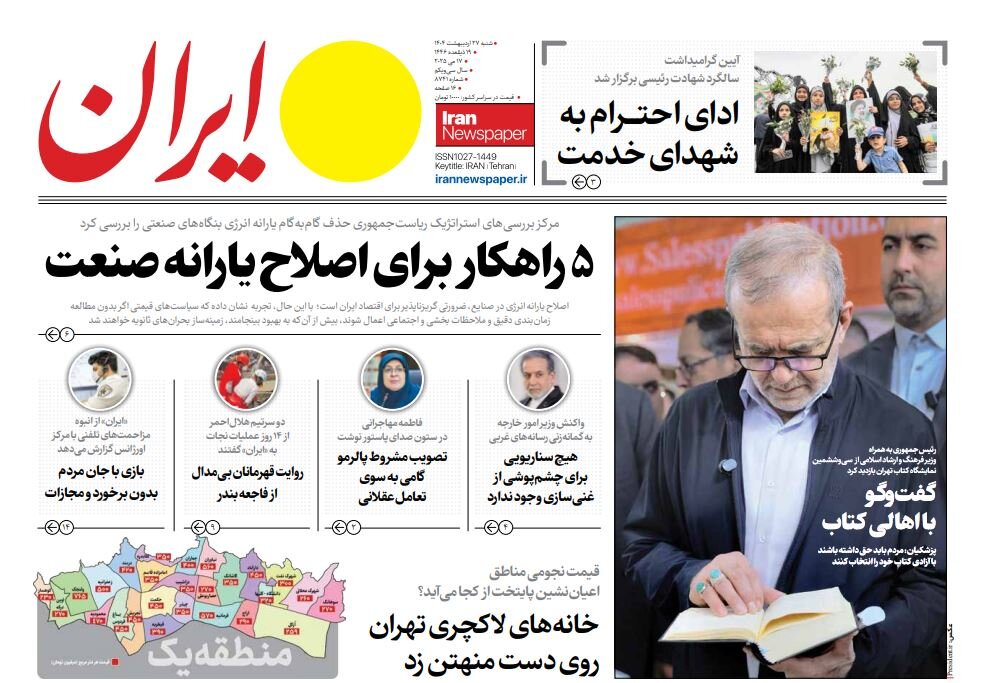Regional consensus to reduce tensions

TEHRAN - In a commentary, the Iran newspaper examined the Arab countries' support for the nuclear talks and said: While U.S. President Donald Trump was starting his trip to the Persian Gulf, Saudi Foreign Minister Faisal bin Farhan quietly but meaningfully supported the sensitive (nuclear) talks between Tehran and Washington.
He expressed hope that the talks would end in a positive result, a short sentence at a historical juncture that carried a significant meaning. The reason for such a stance mostly resulted from Araghchi’s approach, who had said he was very interested in a regional understanding of the talks. The Saudi rulers are trying to get out of the heavy and costly alliances of the past and, with a fresh look at the new regional equations, redefine friends and enemies. In this new model, Iran is no longer a threat; rather, it can be a rival with whom differences can be managed. According to regional experts, unlike previous periods, we are witnessing an unprecedented level of political support for Iran from the regional Arab countries. Arab countries have learned that in the Middle East, there is no way to peace except through understanding.
Ettelaat: Iran and US are closer than ever to an agreement
Ettelaat sought the views of Hassan Hanizadeh, a political analyst, about Donald Trump's contradictory statements regarding Iran. Hanizadeh said: Donald Trump repeatedly makes contradictory statements and is known as a controversial figure for this reason. Accordingly, these days, when Iran and the United States are negotiating, one day he talks about interacting with the Iranians and the next day he says Iran poses threats and plays a destructive role. Therefore, Iranian diplomats who are negotiating with the American side must be vigilant not to be deceived by them. The Iran-U.S. negotiations to date are sending positive signals that increase hopes for the realization of an agreement. In any case, there are many minor and major issues between Iran and the United States. If Tehran and Washington insist on their views, even a minimal agreement is unlikely. However, observations show that Iran and the United States are closer to an agreement than ever before.
Hamshahri: Psychological warfare instead of negotiation
In a note, Hamshahri pointed to American rhetoric instead of the right path of negotiation and wrote: While Iran has a strong will to reach an agreement, the American side has not yet announced any position on the effective lifting of sanctions, except rhetoric and psychological games. Iran and the United States have held their fourth round of indirect negotiations, and the media outlets are reporting on the wishes and demands of each party. Although Iran announced that it was ready to strike an agreement and comply with some of the U.S. demands if sanctions were effectively lifted, Washington has so far shown no willingness to lift sanctions. It has merely resorted to psychological warfare and generalizations. Long before the start of indirect talks, Trump's most important technique for pressuring Tehran to achieve the White House's goal at the negotiating table was to present the Islamic Republic's governing system, especially its defense/nuclear doctrine, as anti-progress that contradicts the wishes of Iranian society for welfare and economic development. Signs of this intention could also be seen during Trump's speech at Riyadh’s investment forum.
Farhikhtegan: Trump spoke against Iran and got his brokerage
In an analysis, Farhikhtegan discussed why Trump spoke about Iran during his trip to Saudi Arabia. The paper said: Apart from financial benefits and media maneuver during his trips to Saudi Arabia and two other Persian Gulf countries, Trump attempted to magnify countries like Saudi Arabia in comparison to Iran and devoted almost a significant part of his speech to Iran. He tried to portray Iran as a weak country and made serious threats against Iran. Actually, the tool of threat is raised against a country when a danger from that country threatens the position of that person or country. However, Trump's emphasis on not allowing Saudi Arabia to be influenced by Iran showed that, contrary to his claims, Iran is still a reliable power in the region and has seriously challenged America's position in the region. The Zionist regime, its regional proxy, is also struggling with many crises. Of course, he had to make these claims to get his brokerage from Saudi Arabia.
Leave a Comment